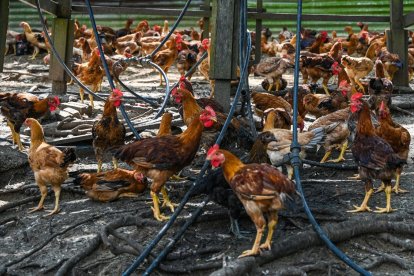WHO confirms first global human death from H5N2 bird flu in Mexico
The patient had "multiple underlying pathologies" and on April 17 developed fever, respiratory problems, diarrhea and nausea, before dying on April 24.

Imagen de referencia. (AFP)
The World Health Organization (WHO) confirmed this Wednesday the death of a person in Mexico in the first known case of human infection with H5N2 avian flu, a different variant than the one detected in the United States.
"This is the first laboratory-confirmed human case of infection with an influenza A (H5N2) virus reported in the world, and the first infection with the avian H5 virus reported in a person in Mexico," declared the health agency of the UN in a statement on its website.
The Mexican authorities had informed the WHO on May 23 of a confirmed case of H5N2 avian flu infection in a 59-year-old person, who had been hospitalized in the capital.
The patient had "multiple underlying pathologies" and on April 17 developed fever, respiratory problems, diarrhea and nausea, before dying on April 24, the WHO said.
In another statement, the Mexican government indicated that he was "a 59-year-old man, with a history of chronic kidney disease, type 2 diabetes, and long-standing systemic arterial hypertension, resident in the State of Mexico."
The UN agency stated that the origin of the infection is "currently unknown" and stressed that the victim had "no history of exposure to birds or other animals."
"There is no risk of contagion"
The organization points out that in March an epidemiological focus of avian flu of the H5N2 type was detected in a poultry farm in the state of Michoacán which borders the State of Mexico.
Other cases in poultry were also identified in March in Texcoco and in April in Temascalapa, both municipalities in the State of Mexico.
"So far it has not been possible to establish" whether the human infection detected is related to these cases in poultry, the WHO said.
Based on the information available, the organization estimates that the current risk that this virus represents for the population is "weak."
Along the same lines, the Ministry of Health of the Mexican government affirms that "there is no risk of contagion for the population" and assures that "all the samples from the identified contacts (of the patient) have been negative."
They also noted that the authorities are controlling the farms near the victim's home and established a permanent monitoring system to detect other cases in the area's wildlife.
In the United States, an outbreak of avian flu has also been recorded, but of the H5N1 type, which has been spreading for several weeks among cattle.
Several cases have been detected in humans, but still no person-to-person transmission.
RECOMMENDATION





















